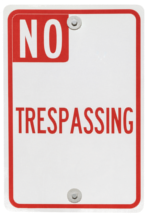Lawyer for Criminal Trespass in Fort Worth TX
Cofer Law, P.C.
300 Throckmorton Street
Suite 500
Fort Worth, TX 76102

Criminal trespass may not be the most heinous crime around, but the penalties for a criminal trespass conviction still involve jail time, fines, and a tainted criminal record. Criminal trespass charges can range from a Class C misdemeanor to a Class A misdemeanor. The penalties for criminal trespass can be steep and depending on the circumstances, you may face up to a year in jail simply for being somewhere without permission. A conviction for criminal trespass can negatively impact your employment and education opportunities as well your ability to rent. If you are convicted of criminal trespass you need a criminal defense attorney who knows the ins and outs of the law and is familiar with Tarrant County’s policies surrounding criminal trespass. Cody Cofer and Lauren Crisera will work to keep your criminal record as clean as possible.
How do I Know if I’m Trespassing?
Under Texas Penal Code § 30.05, a person trespasses when they enter or remain on or in property with notice that they do not have consent to be there. If a person receives notice to leave the property but fails to do so, this is also criminal trespassing. Posted signs are the most frequently used method of providing notice but there are several other, less obvious ways also included in the definition.
“Entry” means the intrusion of the entire body.
“Notice” can mean several things, including:
- Oral or written communication by the owner or someone with apparent authority to act for the owner;
- Fencing or other enclosure obviously designed to exclude intruders or contain livestock;
- Signs posted on the property or at the entrance to the building, reasonably likely to come to the attention of intruders indicating that entry is forbidden;
- Readily visible purple paint marks of proper placement and size on trees or posts no more than 100 feet on forest land or 1,000 feet apart on non-forest land;
The visible presence on the property of a crop grown for human consumption that is under cultivation, in the process of being harvested, or marketable if harvested at the time of entry.
What is the Punishment for Criminal Trespass?
In most cases, criminal trespass is a Class B misdemeanor and carries with it a jail term of up to 180 days and/or a fine of up to $2,000.
Criminal trespass can be a Class C misdemeanor if the offense is committed either on agricultural land within 100 feet of the boundary, or on residential land within 100 feet of a protected freshwater area. The fine for a Class C misdemeanor is up to $500.
In the worst case, criminal trespass can be a Class A misdemeanor if one enters certain types of property, such as a shelter center or critical infrastructure facility or the person carries a deadly weapon during the commission of the offense. If a person is charged with a Class A misdemeanor they could face up to one year of jail time and/or a fine of up to $4,000.
Concealed Handguns and Criminal Trespass
Holders of concealed handgun licenses may face separate a criminal trespass charge in Texas if they carry a handgun onto another’s property with notice that firearms are prohibited. An offense of criminal trespass by a concealed handgun license carrier is a Class A misdemeanor and violators may find themselves facing up to one year in jail and/or a $4,000 fine.
Important Definitions Related to Criminal Trespass
“Agricultural land” means land that is located in Texas and is suitable for:
- Use in production of plants and fruits grown for human or animal consumption or for the production of fibers;
- Forestry and the growing of trees for the purpose of commercial or personal consumption;
- Domestic or native farm or ranch animals kept for use or profit.
“Critical infrastructure facility” means one of the following if enclosed by a fence or other physical barrier that is obviously designed to exclude intruders:
- A chemical manufacturing facility;
- A refinery;
- An electrical power generating facility, substation, switching station, electrical control center, or electrical transmission or distribution facility
- A water intake structure, water treatment facility, wastewater treatment plant, or pump station;
- A natural gas transmission compressor station;
- A liquid natural gas terminal or storage facility;
- A telecommunications central switching office;
- A port, railroad switching yard, trucking terminal, or other freight transportation facility;
- A gas processing plant, including a plant used in the processing, treatment or fractionation of natural gas; or
- A transmission facility used by a federally licensed radio or television station.
“Protected freshwater area” means the portion of the bed, bottom, or bank of any navigable river or stream that lies at or below the gradient boundary of the river or stream.
Cofer Law, P.C.
300 Throckmorton Street
Suite 500
Fort Worth, TX 76102